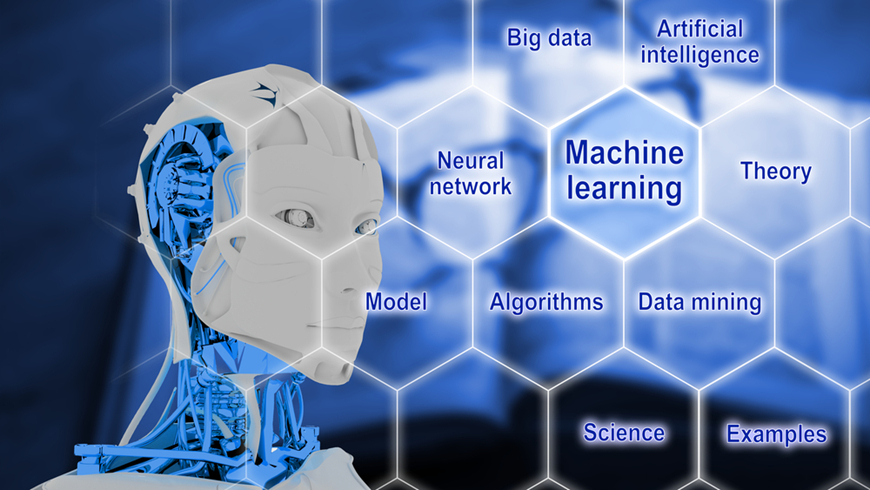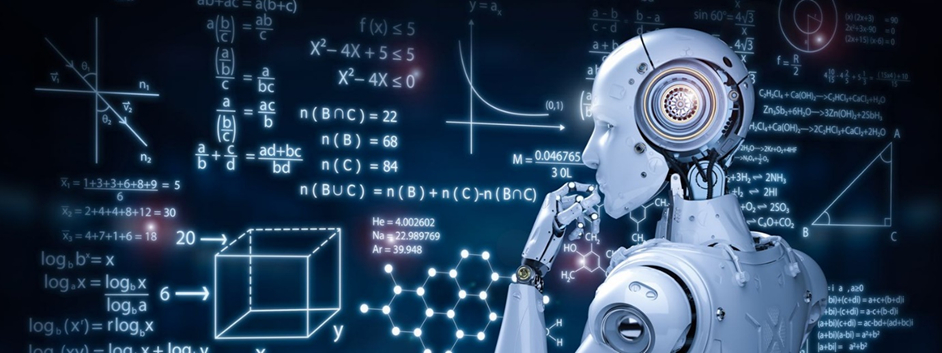B.Tech in Artificial Intelligence and Machine Learning
B.Tech in Artificial Intelligence and Machine Learning
B.Tech in Artificial Intelligence and Machine Learning
Duration:4 years, Eight semesters (Admissions open for the batch 2023-24).
Eligibility:
Pass in 10 + 2 / 12th Standard with 45% marks (40% in case of candidate belonging to SC/ST category).
Lateral Entry:
The candidates, who have successfully completed 3 year diploma in Engineering, are eligible to apply for lateral entry into 2nd year of B.Tech. Courses .Candidates will be admitted to second year of the programme only after appearing the Srinivas University selection process for engineering programme.
About B.Tech in Artificial Intelligence and Machine Learning:
The B.Tech in Artificial Intelligence and Machine Learning is specialisation program designed to enable students to build intelligent machines, software, or applications with a cutting-edge combination of machine learning, analytics and visualisation technologies. The course will include study of algorithms, signal processing, robotics and mathematical foundations, AI methods based in different fields, including neural networks, data mining, in order to present an integrated treatment of machine learning problems and solutions. The course also provides abundant opportunities to students to work on self-designed mini-projects, develop communication skills, explore internship opportunities in industry and take part in national and international conferences and circuit/Software design contests. The department is committed to promote research, industrial interaction and multi-dimensional development of the students with theoretical as well as practical exposure.


Special Features of the Program:
- State of art facilities with modern multimedia lecture & seminar halls.
- Well-equipped laboratories with modern instruments with latest technology.
- Continuously upgraded laboratories for hands on training.
- Good study materials will be provided for every subject.
- Industry oriented syllabus with special focus on hands on training.
- Project/Mini project in each semester.
- Innovations in examination system with opportunity for personal seeing of evaluated papers.
- Make-up exams in every semester to avoid year loss.
- Placement support and research oriented projects for every student.
- Focus on Soft Skill Development & Training on competitive exams.
- Regular Technical Seminars by experts.
- Interaction with Industries, R & D organizations.
- Regular Industrial Visits.
- Separate Hostel & Transport facility for Boys & Girls.
Career Opportunities:
Graduation in Artificial Intelligence and Machine Learning provides career roles as
- Data Scientist
- Data Engineer
- Business Analyst
- Data Analyst
- IoT/AI/ML Engineer
- Business Intelligence Engineer
- Research Scientist
- Further Opportunity to pursue M.Tech.
- Opportunity to appear for GATE/Engineering Services and other competitive Exams.
Faculty details:
| Sl. No. | Faculty Details | Photo |
| 1 |
Dr. K. T. Veeramanju Ph.D Professor |

|
| 2 |
Dr. Vishwanath Pai M. Ph.D Professor |

|
| 3 |
Dr. Naveen Kumar J. R. Ph.D Professor |

|
| 4 |
Mr. Anvar Shathik M.Tech, (Ph.D) Associate Professor |

|
Course Structure:
| SEMESTER 1 | SEMESTER 2 | ||||
| S. No. | Subject | Credit/ Marks | S. No | Subject | Credit/ Marks |
| 1 | Engineering Physics of Materials | 4/100 | 1 | Engineering Chemistry of Materials | 4/100 |
| 2 | Computer Software Concept & Programming | 4/100 | 2 | Information Communication & Computation Technology | 4/100 |
| 3 | Elements of Electrical & Electronics | 4/100 | 3 | Elements of Mechanical and Civil Engineering | 4/100 |
| 4 | Quantitative Techniques in Engineering –I/II | 4/100 | 4 | Quantitative Techniques in Engineering –I/ II | 4/100 |
| 5 | Lab on Engineering Physics of Materials | 1.5/100 | 5 | Lab on Engineering Chemistry of Materials | 1.5/100 |
| 6 | Electrical & Electronics Lab | 2/100 | 6 | Computer Aided Engineering Drawing Lab | 2/100 |
| 7 | Lab on Computer Programming | 1.5/100 | 7 | Lab on Spreadsheet Programming | 1.5/100 |
| 8 | Technical English (ESEP – Xlanz) | 2/50 M | 8 | Professional English ( ESEP – Xlanz) 2/50 M | |
| 9 | Principles of Environmental Studies | 2/50 M | 9 | Constitution & Professional Ethics | 2/50 M |
| 10 | Kannada/ Co-curricular Activities/Sports (ESEP) | - | 10 | Kannada/ Co-curricular Activities/Sports (ESEP) | - |
| Total Credit | 25/800 | Total Credit | 25/800 | ||
| SEMESTER 3 | SEMESTER 4 | ||||
| Sl. No. | Subject | Credit/ Marks | Sl. No. | Subject | Credit/ Marks |
| 1 | Engineering Statistics | 4/100 | 1 | Discrete Mathematical Structures and Graph Theory | 4/100 |
| 2 | Data Structures and its Applications using C | 3/100 | 2 | Design and Analysis of Algorithms | 3/100 |
| 3 | Computer Architecture and Design | 3/100 | 3 | Database Management System | 3/100 |
| 4 | Object Oriented Programming using JAVA | 3/100 | 4 | Computer Network | 3/100 |
| 5 | Foundations of Artificial Intelligence | 3/100 | 5 | Fundamentals of Machine Learning | 3/100 |
| 6 | Data Structures using C Lab | 2/100 | 6 | Database Management Systems lab | 2/100 |
| 7 | Oops Using Java Lab | 2/100 | 7 | Computer Network Lab | 2/100 |
| 8 | Employability Skills Enhancement Programme 1 (ESEP 1) | 2/50 | 8 | Employability Skills Enhancement Programme – 2 (ESEP – 2) | 2/50 |
| 9 | International Certification Course on Current Trends - 1 | 1/0 | 9 | International Certification Course on Current Trends - II | 1/0 |
| Total Credits/ Total Marks | 23/750 | Total Credits/ Total Marks | 23/750 | ||
| SEMESTER 5 | SEMESTER 6 | ||||
| Sl. No. | Subject | Credit/ Marks | Sl. No. | Subject | Credit/ Marks |
| 1 | Operating Systems | 3/100 | 1 | Web Technology | 3/100 |
| 2 | Microprocessor and Interfacing Techniques | 3/100 | 2 | Foundations of Deep Learning | 3/100 |
| 3 | Introduction to Artificial Neural network | 3/100 | 3 | Core Elective - 1 | 3/100 |
| 4 | Introduction to Natural Language Processing | 3/100 | 4 | Core Elective - 2 | 3/100 |
| 5 | Computer Graphics | 3/100 | 5 | Open Elective -1 | 3/100 |
| 6 | Operating System Lab | 2/100 | 6 | Machine Learning Lab | 2/100 |
| 7 | Artificial Intelligence Lab | 2/100 | 7 | Fundamental of IOT Lab | 2/100 |
| 8 | Employability Skills Enhancement Programme 3 (ESEP 3) | 2/50 | 8 | Employability Skills Enhancement Programme 4 (ESEP – 4) | 2/50 |
| 9 | Internship – I | 2/50 | 9 | MOOC – 2 (Department Specific) | 1/50 |
| 10 | MOOC – 1 (Department Specific) | 1/50 | 10 | International Certification Course on Current Trends – 4 | 1/0 |
| 11 | International Certification Course on Current Trends - 3 | 1/0 | |||
| Total Credits/ Total Marks | 25/850 | Total Credits/ Total Marks | 25/850 | ||
| Sl. No. | Core Elective – 1 | Sl. No. | Core Elective – 2 | Sl. No. | Core Elective – 3 |
| 1 | Fundamental of IoT | 1 | Computer Vision | 1 | Business Intelligence |
| 2 | Computational Intelligence | 2 | Image Processing | 2 | Introduction to Entrepreneurship |
| 3 | Distributed Computing | 3 | Network and System Security | 3 | Introduction to Business Management |
| SEMESTER 7 | ||
| Sl. No. | Subject | Credit/ Marks |
| 1 | Cloud Computing | 3/100 |
| 2 | Data Science | 3/100 |
| 3 | Information Security | 3/100 |
| 4 | Core Elective - 3 | 3/100 |
| 5 | Big Data Analytics | 3/100 |
| 6 | Cloud Computing Lab | 2/100 |
| 7 | Mini Project | 2/100 |
| 8 | Internship – II | 2/50 |
| 9 | ESEP: Patent Filing & IPR | 2/50 |
| 10 | Social Internship | 0/100 |
| Total Credits/ Total Marks | 23/900 | |
| Sl. No. | Core Elective – 3 | |
| 1 | AI in Cyber Security | |
| 2 | High Performance Computing | |
| 3 | Introduction to Soft computing | |
| SEMESTER 8 | ||
| Sl. No. | Subject | Credit/ Marks |
| 1 | Technical Seminar | 2/100 |
| 2 | MOOC – 3 – (Research Methodology) | 1/50 |
| 3 | Project (With Patent Application) | 12/200 |
| Total Credits/ Total Marks | 15/350 | |
Note :
(1) University Registration Fee, Semester Registration Fee, Eligibility Fee for other State/NRI students,
Examination Fee, Uniform Fee, Hostel Fee, Industry visit fee, Internship fee, Transportation fee, Sports & games
fee, Extra-curricular activity fee, etc., are extra. The course fees mentioned for subsequent years may vary annually
up to 6%.
(2) The University Placement & Training Team will assist the admitted students to get (a) Earn While Learn, (b)
Industry Internship, and (c) Final Job Placement.
(3) Karnataka Quota* : 1. Applicable only to Karnataka students having 50% or more in the applicable subject
combination. 2. To be considered as Karnataka domicile student should have studied last 7 years including
PUC/Degree in the Karnataka
(4) SC/ST/OBC Candidates should submit the Caste Certificate and Income Certificate to become Eligible

